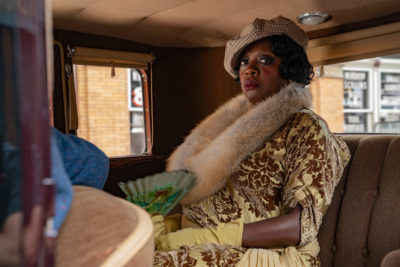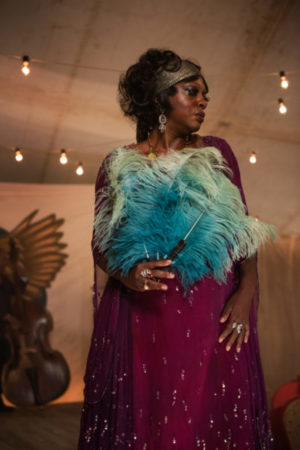Ma Rainey’s Black Bottom is the latest work of the iconic playwright, August Wilson, brought to life on the big screen by producer Denzel Washington. The film stars Viola Davis, Glynn Turman, Coleman Domingo, Michael Potts, Taylor Paige, and Chadwick Boseman, in his final role before his tragic death. Based on the award-winning play, Ma Rainey’s Black Bottom is inspired by Gertrude “Ma Rainey,” also known as the “Mother of the Blues.” She is credited with influencing a generation of blues singers.
With 1920’s Chicago as the backdrop, Ma Rainey’s Black Bottom takes place in the Bronzeville recording session as Ma Rainey travels from the South to Chicago with her musicians to record her music. Her horn player, the ambitious Levee, played by Chadwick Boseman, challenges Ma Rainey almost always musically as he is trying to make a name for himself in the music industry.
In a conversation with director George C. Wolfe and Actress Viola Davis, they discuss the film, Ma Rainey’s Black Bottom, the impact of August Wilson’s work, and working with the late Chadwick Boseman.
On the Importance of the Play and Film, Ma Rainey’s Black Bottom:
Viola Davis: Coming out of slavery, during Jim Crow, they really believed in the promise of the Great Migration, and there were more opportunities in the north, particularly Chicago. There was hope there. When you look at Ma Rainey as a narrative, you see those hopes and dreams, and what America promised us mixed with the trauma of our past, then combined with the lack of opportunities, you see how it affects characters like Ma Rainey and Levee. The past becomes an obstacle in achieving that. You see the talent, humor, and life force…that’s the tragedy of it. It is still the promise of what we could be.

On Transforming the Play into a Film:
George C. Wolfe: All of August Wilson’s plays are set in Pittsburgh except this one. Ma Rainey’s Black Bottom is set in Chicago, and it is the only play of his based on a real person’s life. I believe he (August Wilson) was exploring the consequences of the great migration. What happened when we left the south?
For me, it was interesting to tell this story. Despite Jim Crow, racial injustice, segregation, lynching, and violence, Ma Rainey built this entertainment empire in the south. Yet, she is forced to negotiate relationships with white power structures when she comes up north. How does someone with a tremendous sense of her own power come into contact with a power structure that is, in many respects, about diminishing her power and extracting “the juice” (i.e., Her blues) and using it for their own financial gain?
It was also important for me to embody Chicago in Ma Rainey’s Black Bottom. To some black people, Chicago was the promised land, a place for growth and upward mobility, but for others, the promised land becomes a place of brutal work and struggle. Chicago becomes a character in the film. In the play, Ma Rainey is recording in Chicago in the winter, but I wanted it to be set in the summer in Chicago for the film. I wanted to see and feel the heat and see the elevated trains. I wanted to film the impact of the hot Chicago heat on this day in this recording session.
This film and play are a metaphor for America. How can it have a future until it comes to terms with its incredibly complicated past?
Why Viola Davis Decided to Take on the Role of Ma Rainey:
Viola Davis: I decided to play her because I did not think I could. There are a lot of things in her that I did not see myself as. She is quite different than the August Wilson characters I have played in the past. She has her own agency, she recognizes those elements that want to desecrate her power, but she is up for the fight. That is what I love about her. It is a chess match from the minute you see her, and I loved that fight in her.

On Her Physical Transformation
Viola Davis: I did what an actor is supposed to do. You do not change the look to fit your comfort level. There was liberation in that for me. I felt freer, actually. I wanted to honor all that she was from her body shape, gold teeth, sweaty, greasy makeup…that is who she was.
Working with Chadwick Boseman:
George C. Wolfe: Chadwick put his entire being into Levee. The character in Ma Rainey’s Black Bottom demands that. He put every ounce of his energy, heat, and passion into this role. It was an absolute joy working on this project with him and everyone in the cast.
Viola Davis: Chadwick was just an artist. That is just who he was. We are in a business where people have business conversations that masquerade as artistic conversations. They do not understand getting on set and demanding their special meals versus getting on set and making choices and doing the work as an actor. It requires leaving your vanity and ego at the door. Chadwick loved it. He demanded it in every single way. For someone so young, it was incredible to watch; that level of not mistaking your presence for the actual event. That is what it was like working with Chadwick. That was the beauty of working with him.
On Denzel Washington Bringing All of August Wilson’s Work to the Big Screen:
Viola Davis: I thank God for Denzel. Bringing August Wilson’s work to the big screen was 40 years in the making. I think Denzel is the perfect conduit to do it because he honors August Wilson and the work. With August Wilson and his work, there are huge speeches and monologues; his work cannot be in the hands of anyone who does not have courage. Denzel was just the man to do it.
The brilliance of August Wilson’s work is that he allows us to talk as people of color. We have a lot to say, and there has been a muzzle placed over us for so long. This work must be in the hands of a great artist. To understand whose hands to put it into, to direct it, and act in it. That is the vision Denzel has.
Ma Rainey’s Black Bottom premieres on Netflix on December 18, 2020.
Danielle Sanders is a journalist and writer living in Chicago. Find her on social media @DanieSandersOfficial.